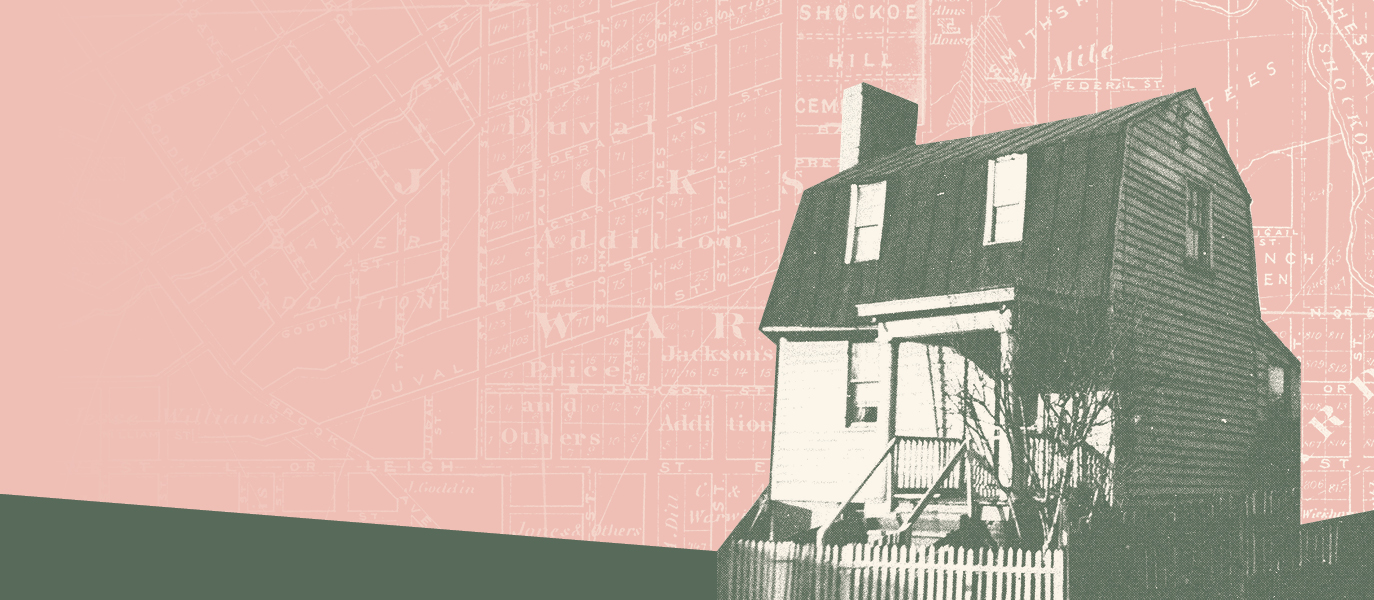House to Highway: Reclaiming a Community History (July 17, 2025 – February 28, 2026) highlights the history of Richmond’s Jackson Ward neighborhood and explores the historic district that was once the center of Richmond’s Black community through the lens of the Skipwith-Roper family. This exhibition is an ongoing partnership between the Library of Virginia and the JXN Project, a historic preservation organization whose mission focuses on illustrating the pivotal role of Richmond’s Jackson Ward in the formation of “the Black American experience.”1
Like many research projects, this partnership and subsequent exhibition began with a question: “Who was the ‘Jackson’ in Jackson Ward?” Dr. Sesha Joi Moon expressed “this inquiry led me to the Library of Virginia and little did I know, but those seven words would help to unearth some of the hidden histories of the nation’s first historically registered Black urban neighborhood.” Her inquiry enthralled Dr. Gregg D. Kimball, who was then the director of the Library of Virginia’s Public Services and Outreach division. In Gregg’s opinion, “the most fundamental function of what we do really comes down … to helping other people tell their story.” Through research conducted by Dr. Moon and various Library staff including Exhibitions Coordinator Barbara C. Batson; Education & Outreach Manager Catherine Fitzgerald Wyatt; and Community Engagement & Partnerships Specialist Ashley Ramey Craig, together with archivists and reference librarians, the exhibition team uncovered the remarkable life of Abraham Peyton Skipwith.
Exhibition Team
From left to right: Catherine Fitzgerald Wyatt, education and outreach manager; Dr. Gregg Kimball, former division director of public services and outreach; Dr. Sesha Joi Moon, co-founder and executive director JXN Project; Barbara C. Batson, exhibitions coordinator; and Ashley Ramey Craig, community engagement & partnerships specialist
Born into slavery, Abraham Peyton Skipwith’s early life remains unknown. Research showed that Skipwith became a skilled and successful businessman in the period of the American Revolution. On December 28, 1789, Skipwith purchased his freedom from Thomas Keene and James Warington, Richmond merchants, for £40. After obtaining his freedom, Abraham purchased land, at 400 West Duval Street in the future Jackson Ward, and built a gambrel-roofed home for his family.
The building of a house and the detailed information in his will demonstrate that Skipwith created generational wealth that remained in the family until the 20th century. His Roper descendants were founding members of Black benevolent societies, and, in 1871, Alpheus Roper became one of the first two Black men elected to represent the newly created Jackson Ward on Richmond’s Common Council.2
The 20th century brought significant advances to Richmond but at a cost. The thriving and self-contained community of Jackson Ward—home to the Skipwith-Roper family, Maggie Lena Walker, John Mitchell Jr., Giles B. Jackson, and many others—would be forever altered by the Richmond-Petersburg Turnpike (RPT). The construction of the turnpike fell under the leadership of the Richmond-Petersburg Turnpike Authority. The Authority was established in 1955 by Virginia’s General Assembly to “administer, design, finance, acquire right-of-way, construct, operate, collect tolls, and maintain the Turnpike.”3 It is important to note that this urban renewal project was funded by bonds sold by the Commonwealth of Virginia and not with federal funds.4 The path of the RPT had been designed to destroy the Skipwith-Roper cottage and disturb the final resting place of Abraham Peyton Skipwith.
It was due to the architectural significance of the cottage, not the remarkable life of Abraham Skipwith and his descendants, that the cottage was saved and moved to Goochland County, Virginia.
Uncovering the remarkable life of Abraham Peyton Skipwith, sisters Dr. Sesha Joi Moon and Enjoli Moon realized that the story of this Black founding father needed to be told in Jackson Ward. In 2022, the Maggie Walker Land Trust donated eleven parcels of land to the JXN Project on which to recreate the Skipwith-Roper cottage. The JXN Project plans for the recreated cottage to open in April 2026 with House to Highway as its permanent exhibition.
Throughout the run of the exhibition at the Library of Virginia, there will be numerous programs that will focus on the history of Jackson Ward, urban renewal, and the legacies of the Richmond-Petersburg Turnpike. In addition, there will be a series of blog posts highlighting similar topics.
Footnotes
[1] “The JXN Consultancy,” The JXN Project, https://thejxnproject.org/who-is-your-jxn%3F.
[2] “The New City Council,” Daily Dispatch, July 4, 1871, https://www.virginiachronicle.com/?a=d&d=DD18710704.1.1.
[3] Renee M. Savits, “A Guide to the Records of the Richmond-Petersburg Turnpike Authority, 1954-1983” [finding aid], 2024, Library of Virginia, Richmond, Virginia, https://ead.lib.virginia.edu/vivaxtf/view?docId=lva/vi06023.xml.
[4] Savits, “A Guide to the Records of the Richmond-Petersburg Turnpike Authority” [finding aid], Virginia, https://ead.lib.virginia.edu/vivaxtf/view?docId=lva/vi06023.xml.













